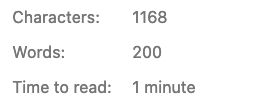A paper presents the result of study. It represents what the writer has learned through deliberate action, often within a well-defined period of time. Here, “study” may refer merely to a few weeks of an undergraduate class or a reasearch project spanning several years. The paper will not always specify the method by which the results were achieved, but the reader should be able to imagine the means by which they would arrive at them themselves. In some cases, the paper will include a detailed methodology that, ideally, puts the reader in a position to replicate the result. In other cases, the paper will be based solely on the reading and thinking that the writer has done. Do notice, however, that even such a “scholarly” or “theoretical” paper, by virtue of its references, allows the reader to “replicate” the “study” that was done. The reader can consult the same texts and give them the same careful consideration. In all cases, the intended reader of a paper is a peer, an intellectual equal, someone who is qualified to tell the writer that they are wrong. A paper opens the results of the writer’s study to the criticism of other knowledgeable people.
Note: Three weeks ago, I decided I would write a paragraph every morning in a well–composed moment: In twenty-seven minutes, I would write at least six sentences and at most two-hundred words that say one thing and support, elaborate, or defend it. This morning, I appear to have hit my stride, producing exactly 200 words that the WordPress text-editor helpfully tells me will take one minute to read. This is nice to see, since I often tell my authors and students that a paragraph represents one minute of your reader’s attention. I also tell them it “normally” fills about half a page, and it struck me, looking at the character count, that 1168 is just over half of the 2275 characters that my institution, the Copenhagen Business School, defines as the “normal page” for purposes of examination. It’s comforting to know that my rules of thumb comply with the law of the land.
